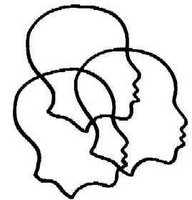 I was intrigued by Christina Patterson's proposition in the Independent the other day that poetry might be the new prozac.
I was intrigued by Christina Patterson's proposition in the Independent the other day that poetry might be the new prozac.The article brought together several areas that I'm interested in. Poetry of course. Then the link between depressive illness and creativity, and the use of creative writing as therapy.
Patterson argues that whilst poetry is increasingly being heralded as a panacea for many ills including depression, it doesn't actually seem to have helped mentally-ill poets like Anne Sexton, Robert Lowell, or Sylvia Plath.
But here I think that here she's got her argument back to front: surely the desire to write poetry is often a symptom of manic-depressive illness, as sufferers tend to delight in language play (punning, rhyming, repetition, torrents of words) and have a sense of divine inspiration. (Patterson might note that Lowell was saved in the end, not by poetry, but by lithium.)
But there is no doubt that writing poetry is good for the health! Patterson cites a joint study between the Arts Council of Great Britain and the Department of Health which suggests that writing poetry boosted levels of immunoglobin A (i.e. the antibody that helps you fend off illness). Write poetry and you won't fall sick so often, is the bottom line.
I decided to google up the other studies she mentions and found much interesting stuff along the way:
Dr Robin Philipp, an occupational physician at the Bristol Royal Infirmary studied the therapeutic properties of poetry writing over several years and found that writing poetry can lift depression in nearly three-quarters of cases:
The study, found 70 per cent of sufferers felt better writing poems and eight per cent improved so much they came off anti-depressants. ... Researchers believe writing poetry forces people to confront their emotions, an essential process in overcoming mental torment. ... Poetry helped them articulate disordered thoughts.There's plenty of other poetry-in-healthcare projects listed on the Poetry Society website if you want to read further.
The Poetry in the Waiting Room Project is an interesting initiative based on the premise that reading poetry is good for your health. Small poetry pamplets are supplied to doctors' waiting rooms and readers are encouraged to keep them. As Patterson points out, it is difficult to substantiate the health benefits from such an approach. But I think that even without the health benefits, getting poetry into the hands of the population at large is no bad thing and could lead to an addiction! (Never mind the patients, this initiative just might be good for poetry!)
I do agree with Patterson's conclusion that poetry for healing is not the same thing as poetry for art. But perhaps in rare cases the two things could overlap? ...
Related posts:
Touched with Fire
Obituary for Egolf
Creative Writing as Therapy
4 comments:
I wonder if your preferred kind of poetry can be to your detriment though? Elegies really cut me up sometimes. I love John Milton's Lycidas for example -- I think it's one of the most beautiful poems ever written in the English language -- but it leaves me so down.
I suppose the theraputic qualities of poetry are similar to those of music really. Some people listen to Kylie and swing their handbags around with delight, others put a Smiths CD in the player and start preparing the noose.
Me? I sing "Suzie is a Headbanger" in deceptively empty streets.
What an interesting comparison, music and poetry. Walker, I guess you must be referring to the earliest origins of poetry as songs. When I come to think of it (the role/function of music and poetry), I think it really does rings true.... People identify with and 'dig' songs of particulat arists and era, as with poetry
From my scant knowledge of music, Bob Dylan is much admired for the poetry of his music and lyrics. Didn't he received an award for literature some time back?
i suppose all the arts have theraupetic value ... art certainly does ... but i think it does you most good to create ... i find that playing my recorders makes me feel really relaxed and happy even if i'll never be concert standard ...
i had to go and print of lycidas ... will read it in the bathroom later ...
guess my cultural refs are somewhat lacking ... haven't heard the song (or can't remember it!)
Absolutely dreamer. Even though the oldest ballad (the Ballad of Judas?) is about 700 years old, the Romans and Greeks were using poetry lyrically for more than 1000 years (at least) before that. In fact, I've just blogged about poetry being all around us...because I do think we're generally more dependent on poetry than we realise. Just not in the printed form.
Btw. Sharon: Lycidas is a tribute to Milton's Cambridge friend, Edward King, whose ship went down on the Irish Sea. Milton seems to take a swipe at the Pastoral form by slowly puncturing the Arcadian vision in the poem. And those last few lines...which see Lycidas become a part of light, water and eternity itself are just *so* moving. Bear in mind I've spent a long, long time analyzing this poem...but I do remember being touched by it (indeed falling in love with it) when I first read it. :-)
Post a Comment